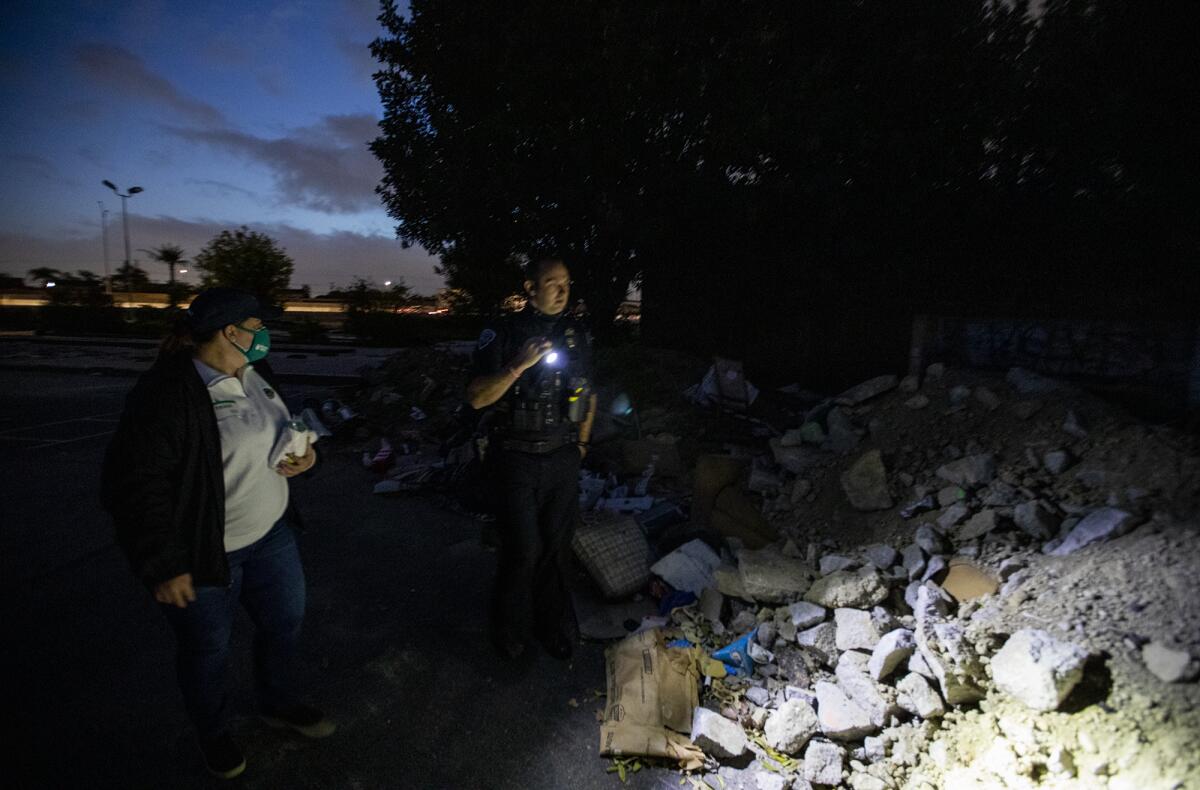Number of homeless in O.C. drops by 17% over 3-year period, recent count shows

- Share via
The number of homeless people in Orange County has decreased by about 17% over the last three years, according to a homeless count that was released Wednesday.
County officials praised the results of the 2022 Point in Time count during a press conference but said there is more work to be done to solve the local homeless crisis. The federally required biennial census was last held in 2019, when 6,860 people were found to be living in shelters or on the street. The current count, the first since the pandemic disrupted plans for the last homeless census, found that there were 5,718 homeless people in the county.
“The takeaway today is good news, but that we still have some work to do,” county Supervisor Don Wagner said during the event.
The report showed about a 23% reduction in the county’s unsheltered population, from 3,961 in 2019 to 3,057 in 2022. Despite an increase in shelter beds, the number of sheltered people also decreased from 2,899 in 2019 to 2,661 in 2022. Doug Becht, director of the county’s Office of Care Coordination, said this is likely due to shelters limiting their capacity because of COVID-19 restrictions.
Becht also said the county is seeing encouraging numbers among unsheltered veterans, young adults and seniors, with each population decreasing since 2019. Veterans on the street decreased from 212 in 2019 to 145 in 2022, while the number of young adults aged 18 to 24 decreased from 158 in 2019 to 109 in 2022. There were 357 homeless seniors counted in 2019, a number that dropped to 300 in 2022.
Becht said this reduction is due to increased regional coordination and the “significant investment and resources” to address homelessness, such as more than $250 million of emergency rental assistance being provided to residents at risk of eviction or homelessness.
“The county, cities and local law enforcement have dedicated more staff and resources to engage folks living on the street to help connect them to housing,” Becht said. “We’ve seen significant input and a significant increase in investment and shelter bed capacity to ensure that less and less people will be experiencing unsheltered homelessness. Finally, we’ve seen an increase in permanent supportive housing and housing choice vouchers dedicated to this specific overall reduction.”

Overall, Becht said that while the numbers may be decreasing, the homeless situation in the county has become more complex as many of the people on the street and in the shelters are older and have mental health issues or other disabilities. The county saw an increase in the amount of homeless people struggling with substance use issues, a physical disability, mental health challenges and people who are victims of domestic violence.
“This trend tells us that people experiencing homelessness are doing so with a greater complexity of needs, and that our system needs to continue to evolve to be better equipped to address those needs,” Becht said. “I anticipate this to be a continued focus of the Commission to End Homelessness and the Continuum of Care board, ensuring that policies and funding are geared towards not only connecting people to services and housing they need, but also providing these people with greater assistance in navigating and coordinating our service system.”
Father Dennis Kriz, a local homeless advocate and pastor of a Fullerton church, is skeptical of the county’s report. During a phone interview after the event, Kriz said the decrease in the homeless count could be at least partially related to the record number of homeless people who have died in Orange County over the last few years. Consecutively, more homeless people died in Orange County in 2020 and 2021 than any other year in its history.
Kriz, who tracks the monthly deaths of the homeless for the Voice of OC, said the homeless death rate per month has more than doubled since 2019.
“They were flatly cheering the decrease, yet they made no mention of the fact that a lot of people died,” Kriz said.

The county and local city governments have been working over the last few years to open more homeless shelters and connect people with housing, but it’s unclear whether the decrease in homeless people can be traced to those moves.
Officials have turned to converting motels into affordable housing as a means to solve the problem. Some of these projects have been a part of a statewide effort called Project Homekey, which entails purchasing and rehabilitating hotels, motels, vacant apartments and other buildings to house people experiencing homelessness. The program was introduced by the state amid the pandemic as a way to transition homeless people to permanent housing.
Costa Mesa recently received $10.7 million in Homekey funding to transition a Motel 6 on Newport Boulevard into permanent supportive housing and Anaheim approved the purchase of the Tampico Motel, a longstanding eyesore in the city, to turn it into affordable housing. That came after the city was awarded $26.5 million in Project Homekey funding to convert a Studio 6 motel on Harbor Boulevard into affordable housing.
Before that, Stanton converted two former motels into 132 units of permanent supportive housing. The city also recently received funding for a third project involving the conversion of the former 21-room Riviera Motel.
The county is also scrambling to connect people with housing after it received a record number of federal housing vouchers last year. The more than 1,000 vouchers were seen as a major step toward helping solve the homeless crisis in the county, but officials and partnering agencies trying to help voucher holders have found it difficult to find available homes in the county’s competitive market. The issue has become all the more crucial with the vouchers set to expire at the end of the year.
Last month, Orange County Supervisor Katrina Foley held a briefing with other officials to address the challenges facing the county’s housing authority as it attempts to lease out the rest of its housing vouchers before the expiration date. They are looking to incentivize landlords to accept the vouchers.
All the latest on Orange County from Orange County.
Get our free TimesOC newsletter.
You may occasionally receive promotional content from the Daily Pilot.






